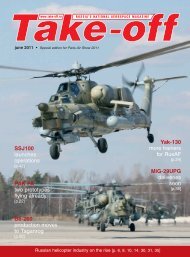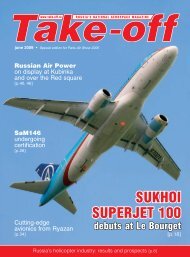You also want an ePaper? Increase the reach of your titles
YUMPU automatically turns print PDFs into web optimized ePapers that Google loves.
cosmonautics | in brief<br />
FSA Chief on prospects of Russian space exploration<br />
The head of the Federal Space<br />
Agency, Anatoly Perminov, has<br />
held several news conferences<br />
over the recent months, in<br />
which he shared with the media<br />
his vision of the state and future<br />
of the Russian space exploration<br />
industry.<br />
According to the FSA chief,<br />
Russia will have orbited six more<br />
spacecraft of the GLONASS satellite<br />
navigation system that is<br />
to start serving Russian users<br />
already in 2007 and provide global<br />
coverage by late 2009.<br />
According to Anatoly Perminov,<br />
the Russian constellation will have<br />
numbered 103 spacecraft, and its<br />
status has improved considerably<br />
since 2004 with the number<br />
of improve navsats having hiked<br />
from 25 per cent in 2004 to 60 per<br />
cent at present.<br />
The FSA head said the space<br />
companies’ net income had tripled<br />
over the past three years, with<br />
their earning capacity having more<br />
than doubled. “There remained<br />
only seven loss-making companies<br />
out of the 103. The annual<br />
salary growth in the industry is 25<br />
percent,” Perminov said.<br />
Dwelling on the future of manned<br />
flight in space, he remarked that<br />
the Clipper reusable spacecraft had<br />
not been approved by a scientific<br />
and technical council. “Scientists<br />
believes that another stage of<br />
developing an advanced manned<br />
transport space system should be<br />
the deriving of a spacecraft from<br />
an existing design”. According to<br />
Perminov, in the world there is<br />
“an aerospace-plane programme<br />
graveyard: there were eight to 12<br />
such spacecraft under development.<br />
Unfortunately, none of the<br />
programmes, except the US Space<br />
Shuttle, has succeeded”.<br />
The chief of FSA thinks that an<br />
advanced Russian manned system<br />
will have been developed by 2015,<br />
and by 2020 with the ISS to wrap<br />
up its operation, there will have<br />
been a new-type Russian space<br />
station in orbit to be used for inorbit<br />
assembly of spacecraft for<br />
46<br />
lunar and other planetary missions.<br />
Anatoly Perminov did not rule out<br />
foreign participation in developing<br />
such a station. Construction<br />
of the new orbital ‘base’ is now<br />
part of the medium-term Russian<br />
space exploration programme for<br />
the period until 2025.<br />
The FSA leader specified that<br />
the agency was not going to pull<br />
out from the Baikonur space<br />
launch facility in the near future.<br />
Responding to the question whether<br />
there is a chill in the Russian-<br />
Kazakh joint space operations,<br />
he said, “The idea is outlandish”.<br />
Perminov sad he had had talks<br />
with Talgat Musabayev, head of<br />
Kazakhstan’s space agency. “We<br />
have got no problems, and more<br />
than 40 agreements on joint work<br />
have been signed”, he maintained,<br />
saying that recurring minor disagreements<br />
and technical issues<br />
are settled in the regular course<br />
of work. “I see no alternative to<br />
Kazakhstan as far as manned<br />
space flights are concerned,” the<br />
FSA boss concluded.<br />
Speaking about plans to explore<br />
the Moon and Mars, Anatoly<br />
Perminov said that they should<br />
have a scientific base and “one<br />
should not stoop to resort to<br />
adventurism”. In his opinion, the<br />
cost of sending a manned spacecraft<br />
to the Mars is estimated at<br />
$40–50 billions. “Russia’s budget<br />
would, probably, survive that, but<br />
FSA’s c<strong>off</strong>ers cannot”, he added.<br />
Nonetheless, Perminov specified,<br />
“We have come up with proposals<br />
for space exploration for<br />
the period until 2040. The proposals<br />
cover all aspects, including<br />
lunar and Martian missions.<br />
Now we have to obtain relevant<br />
financial and material resources”.<br />
The proposals cover several<br />
fields, particularly, further use of<br />
near-Earth space, development of<br />
the Moon and a flight to Mars.<br />
Readiness for landing on the Moon<br />
is to be achieved by 2025, a lunar<br />
base is to be set up between 2027<br />
and 2035 and a mission to Mars is<br />
slated for 2035 or later.<br />
According to Anatoly Perminov,<br />
FSA has not decided yet on the<br />
location for a new space launch<br />
centre. “If we develop an advanced<br />
manned spacecraft, e.g. for Moon<br />
missions, it will need an advanced<br />
launch vehicle that needs a new<br />
launch pad. Where the latter<br />
should be built remains undecided<br />
yet, but I think we should consider<br />
not only Baikonur to this end, but<br />
the territory of Russia as well”,<br />
Perminov said. “No matter where<br />
we start [construction of a new<br />
launch pad], we have to start from<br />
scratch. It is a very difficult thing<br />
to do in economic and technological<br />
terms. Still, it is doable”.<br />
Touching on international cooperation,<br />
FSA’s chief noted that cooperation<br />
with other countries has<br />
surged recently. The agency cooperates<br />
with 38 countries. Perminov<br />
noted, among other things, that<br />
“good relations with Arab countries<br />
are evolving” as far as remote<br />
Earth sensing, space communications<br />
systems and manned flight<br />
programmes are concerned.<br />
Commenting the South Korean<br />
launch vehicle development pro-<br />
gramme and construction of a<br />
launch centre in the Republic of<br />
Korea, Anatoly Perminov said<br />
relevant agreements had been<br />
reached and contracts signed<br />
and Khrunichev would roll up its<br />
sleeves in late 2007. “Essentially,<br />
Russia is <strong>off</strong>ering one stage and<br />
the launch complex. Full-scale<br />
work is to begin in 2008, and the<br />
first flight under programme may<br />
take place in 2009”, he added.<br />
As to a first Russian space<br />
tourist planned to fly to the ISS in<br />
2009, Anatoly Perminov said he<br />
would be a businessman turned<br />
politician. FSA’s chief decline to<br />
name the man, citing the cosmonaut<br />
candidate’s personal<br />
request of anonymity for a while.<br />
Commenting on rumours of the<br />
feasibility of Russian President<br />
Vladimir Putin’s space flight,<br />
Perminov denied any FSA plans<br />
to this end, “I do not think it is<br />
serious. We have not planned any<br />
thing of the kind, let alone doing<br />
it for the president. The matter<br />
is not on the agenda. I guess the<br />
President has enough places to<br />
visit and enough work to do”.<br />
take-<strong>off</strong> november 2007 www.take-<strong>off</strong>.ru




